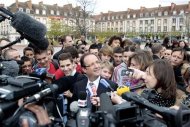French voters voiced disillusionment on Saturday at a campaign that many said ignored the country's real problems, on the eve of a first-round vote expected to send President Nicolas Sarkozy and Socialist rival Francois Hollande to a runoff next month.
A day ahead of voting in mainland France, the first ballots were cast in overseas territories, from French Guiana on the northern shores of South America to the Pacific islands of Polynesia.
In France, the presidential campaign largely disappeared from the airwaves as the 10 candidates observed a one-day blackout imposed by law from midnight on Friday.
Final polls showed Hollande narrowly ahead of conservative Sarkozy for Sunday's first round and comfortably winning the May 6 runoff to become France's first Socialist president since Francois Mitterrand left office in 1995.
The prospect of record abstention loomed over Sunday's ballot, with many people complaining that none of the candidates appealed to them.
Under the banner "They Don't Represent Us", hundreds of young demonstrators marched through Paris.
"Not one of the candidate appears credible to me. Politics is controlled by finance," Duncan, a 19-year-old student, told Reuters as the protest converged on the stock exchange.
On the otherwise quiet streets of the capital, many passersby expressed frustration that mainstream candidates had not focused on the main challenges facing the euro zone's second largest economy, such as unemployment running at a 12-year high.
"The campaign has not been serious enough. The important issues have not been discussed," said Frederic Le Fevre, a self-employed businessman. "They've focused on childish arguments, throwing blame at each other."
Candidates argued for weeks about halal meat and the cost of a driving licence. Even the leading contenders tried to win the limelight with largely symbolic proposals, like Hollande's plan to scrap the word "race" from the constitution and Sarkozy's offer to bring monthly pension payments forward by eight days.
Frustration at mainstream parties was expected to boost radical candidates, such as far-right leader Marine Le Pen and Communist-backed Jean-Luc Melenchon, lying third and fourth in polls. The other big winner could be abstention with one poll suggesting almost a third of voters could stay at home.
"None of the candidates in this election represents us. I will not vote. It is the only possible act of rebellion," said one of the demonstrators at the stock market.
Hollande, mindful of an upset in 2002 when National Front leader Jean-Marie Le Pen knocked out Socialist Lionel Jospin in the first round, warned supporters against complacency at a closing rally on Friday.
"Nothing should be taken for granted," he said.
RADICAL CANDIDATES FLOURISH
Polls in mainland France were due to open on Sunday from 8 a.m. to 6 p.m. (0600 to 1600 GMT), with voting stations in big cities open two hours longer. The first official results will be released after the last voting booths close at 8 p.m.
After trailing Hollande for months, Sarkozy had edged ahead in first-round voting intention polls for a few weeks, helped by his strong response to a shooting spree by an al Qaeda-inspired gunman who killed seven people in southwest France last month.
He lost that lead last week and polls on Friday showed Hollande winning the first round by 28 percent to 27, and taking the second by 55 percent to 45.
It would be the first time in France's Fifth Republic, founded in 1958, that an incumbent president has not finished top of the first round.
"If he comes second, we've had it," a close Sarkozy advisor told Le Monde newspaper.
Hollande has promised to raise taxes on large corporations and people earning more than 1 million euros a year to help pay for higher spending on education and pensions. With the euro zone in crisis, that prospect has placed France's strained finances in the spotlight.
The risk premium investors charge for holding French 10-year bonds over German Bunds rose to nearly 150 basis points in a possible foretaste of market jitters over an Hollande victory.
Investors think Hollande - who was catapulted to the Socialist candidacy by the arrest of former IMF chief and party favourite Dominique Strauss-Kahn - may face pressure to go beyond his centre-left programme if a resurgent hard left led by Melenchon holds the balance of power.
Strauss-Kahn was later cleared of criminal charges of sexually assaulting a New York hotel maid.
But with polls suggesting most Melenchon voters would vote Socialist on May 6, the second round is expected to be more of a battle for the middle ground, as both Hollande and Sarkozy try to reconnect with the roughly one-quarter of undecided voters.
"I don't know how to vote for," said Brice, a fish-seller in Paris. "I think it won't change anything whoever wins."
Olivier Milleron, who played the trumpet in the "They don't represent us" march, said he would still vote on Sunday.
"I think that it actually does matter whether we have a left-wing or right-wing government," he said.
(Additional reporting by Pauline Mevel; Editing by Andrew Heavens)


No comments:
Post a Comment